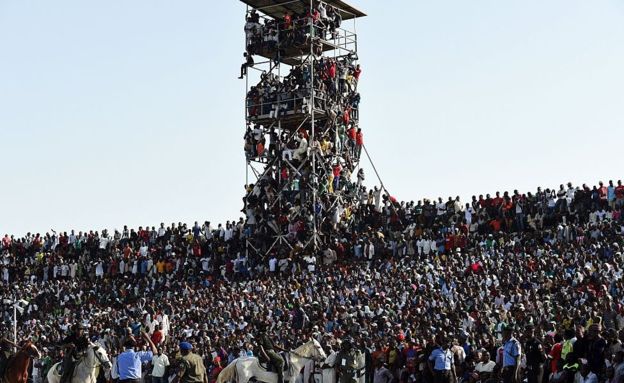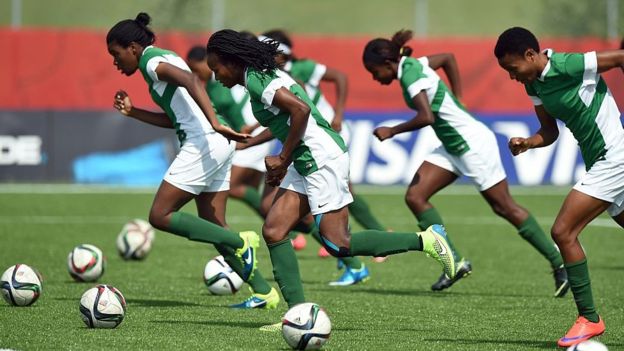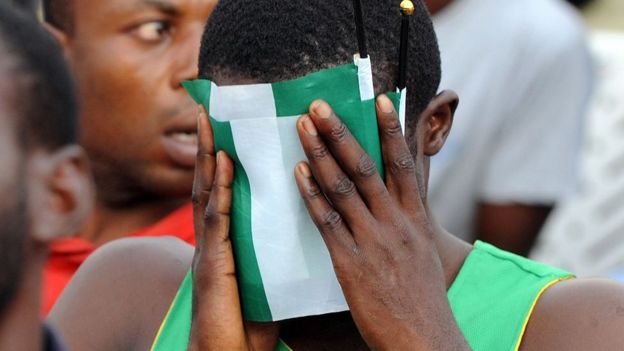In our series of letters by African journalists, novelist and writer Adaobi Tricia Nwaubani blows her vuvuzela for Nigeria’s Super Falcons.
Last week, Nigeria’s national women’s football team, the Super Falcons, secured a place in the 10th Africa Women’s Cup of Nations scheduled to take place in Cameroon later this year.
Three weeks ago, their male counterparts, the Super Eagles, failed to qualify for the African Cup of Nations kicking off in Gabon at the start of 2017.
The Falcons are Africa’s reigning champions; the Super Eagles have failed to qualify on two consecutive occasions.
Nigerians cannot be too surprised at the disparity of performance between our male and female teams.
Reality TV
Anyone who cared to look would have seen it coming.
The men’s team sometimes comes across as a reality TV show rather than professionals who have been hired to win honour for their country.
There is always some new drama when it comes to keeping up with the Super Eagles.

In the past 12 months alone, the men’s football team has had three different coaches.
Each replacement was heralded by incessant bickering between the coach and his players, and with the sport’s national federation.
In October, goalkeeper Vincent Enyeama suddenly announced his retirement from the national team a day after he was officially stripped of the captain’s armband by coach Sunday Oliseh.
Oliseh himself became the focus of the cameras in February, when a rant he posted on YouTube went viral.
Staring straight into the camera, with what appeared to be family photos in the background, he accused some of the team’s critics as “insane” for expecting Nigeria to win every single match, then concluded the almost three-minute tirade with a heartfelt prayer for God to bless the critics with the same apparent ill-will that they wish the Eagles.
Oliseh was soon replaced by the current acting coach, Samson Siasia.
In sharp contrast, the Nigeria women’s football team go about their business without much drama.
The one time they attracted the kind of embarrassing attention that typically comes to Nigeria from their male counterparts was in June 2015, when their coach, Edwin Okon, apparently refused to shake hands with US coach, Jill Ellis, who approached him with her hand outstretched after Nigeria lost a match to her team.
But then, Okon is a man.
Bonus row
The Super Falcons have won the women’s Africa Nations Cup – formerly known as the African Women’s Championship – more than any other country – an impressive nine times.
They have also made it to every Women’s World Cup since the Fifa competition began in 1991.

But despite the women’s team being a sure-fire powerhouse in Africa, who continue to do their country proud, the Nigerian Football Federation does not seem to think that the women’s team deserves to be treated well.
News reports stated that the Falcons were handed a paltry 10,000 naira each ($50, £35) after they successfully booked a ticket to the 2016 Africa Women’s Cup of Nations.
This is in contrast with the men’s team, whose players get paid $4,000 each for a draw and $5,000 for a win.
The women are also reportedly still owed their bonuses for qualifying for last year’s World Cup in Canada.
None of this is new.
Back in 2010, Nigerian sport journalist Nnamdi Okosieme reported extensively on how the Falcons had been playing for peanuts.
The women received $500 for every match won at the World Cup, while the men got $30,000.
And, while the male team were lodged in five-star hotels, the women’s team was regularly kept in substandard accommodation, he said.

The Nigerian Football Federation’s poor treatment of the women’s football team is just another example of the enormous inequality that Nigerian women suffer in many sectors of society.
The new Sustainable Development Goals (SDGs) adopted in September by UN member states, including Nigeria, offer a unique opportunity to address many of these issues.
Sports can be an important enabler for development and women’s empowerment.
Bridging the treatment gap between the country’s men’s and women’s football teams is a good place for the Nigerian government to display its official commitment to gender equality.
So let’s blow the whistle on such sexism – and celebrate all our “Super” sporting successes.

